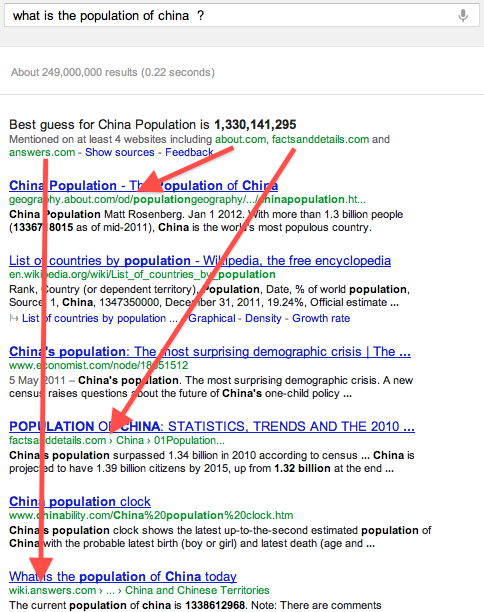I know I have been talking a lot about both Facebook and Google lately, but don’t blame me! Blame them, they can’t stand without making us talk about them. So, today’s subject will be the “Google semantic search”. Or call it “Intelligent Search” but any ways it’s something crazy.
Goodbye blue links ?
After Plus-sifying itself, Google is taking it to another level, or at least pretending to. Everybody’s been talking about it lately, and the big change is that it will “directly answers to queries at the top of the search-results page” .
As soon as I saw the news, I asked Google “who’s the cutest girl in the world?”. My name didn’t come out on the search-results page! Looks like Google has some limited semantic search capabilities right now, don’t you think?
More seriously, as pointed out in Search Engine Land’s article, Google’s been doing semantic search for years now.
“If you search for [principles of physics], our algorithms understand that “angular momentum,” “special relativity,” “big bang” and “quantum mechanic” are related terms that could help you find what you need.”
Year’s ago I remember Googling mathematical formulas in the search bar and get my answer right away. So what’s the hard move to semantic search Google has been talking about? I have the feeling that Google’s been doing semantic forever.
Don’t get me wrong, I’m Google’s number one fan, but isn’t it interpreted bigger than it really is. I did some research and found a clear explanation of what Google does , or should I say does not :
“Google doesn’t understand the question. it gives you a results based on the keywords in the phrase and sites with significant authority on those words.”
In other words, as pointed out by Amit Singhal a Google Fellow “We cross our fingers and hope someone on the web has written about these things or topics”.
So that’s the difference between what I thought was semantic search and what really is. It’s what the human brain does naturally, but for computers, it’s known as Artificial Intelligence.
Here’s what you will see :
For sure, getting the user to the results will be much less subject to manipulation. But guess who’s complaining about it. SEOers!!
SEOers Vs Google Semantic Search
SEOers might have the feeling that what they’ve been doing was a total waste of time. Indeed, they have been fighting to get a website to rank first on a given keyword submitted to Google. So what’s the meaning of their daily task if Google users don’t even need to visit websites anymore?
Question is, does it take traffic away from websites?
The answer is YES. A relatively small set of website are concerned though.
It will surely prevent Google users from clicking on websites providing the answer to a query but optimized sites will remain at the top of the page-results.
Don’t worry the sources also get surfaced as regular results. The websites with the best position – not to mention Wikipedia- remain on top. And after all, with the answer already in some of the page descriptions, they probably weren’t clicking much already. Let’s say it shouldn’t impact the much larger set of sites out there with broader information.
Inevitably, by providing users with direct results rather than links to other websites containing typed keywords Google will manage users to spend more time on its site, and therefore earn more revenue from advertising.
Good move!
Can’t wait to see what Google will answer to “Does Santa Claus exist?” !
Let us know your thoughts in the comments.


10 Comments
ينعكس التزام المصنع بالابتكار في جهود البحث والتطوير المستمرة لتحسين تصميم ووظائف تركيبات HDPE و uPVC الخاصة بهم. إيليت بايب Elite Pipe
591036 481251You completed various good points there. I did a search on the theme and discovered the majority of folks will consent along with your blog. 311679
462055 251832Hi my loved one! I wish to say that this post is amazing, wonderful written and come with almost all essential infos. I would like to see much more posts like this . 831950
Sutter Health
453025 858899Also, weblog regularly and with fascinating material to keep individuals interested in coming back and checking for updates. 764039
Some really excellent info I look forward to the continuation.
I do not even understand how I ended up here but I assumed this publish used to be great
There is definately a lot to find out about this subject. I like all the points you made
841236 267284So, is this just for men, just for women, or is it for both sexes If it s not, then do women require to do anything different to put on muscle 371764
501723 598455You know, a lot of people are searching round for this information, you could aid them greatly. 926009